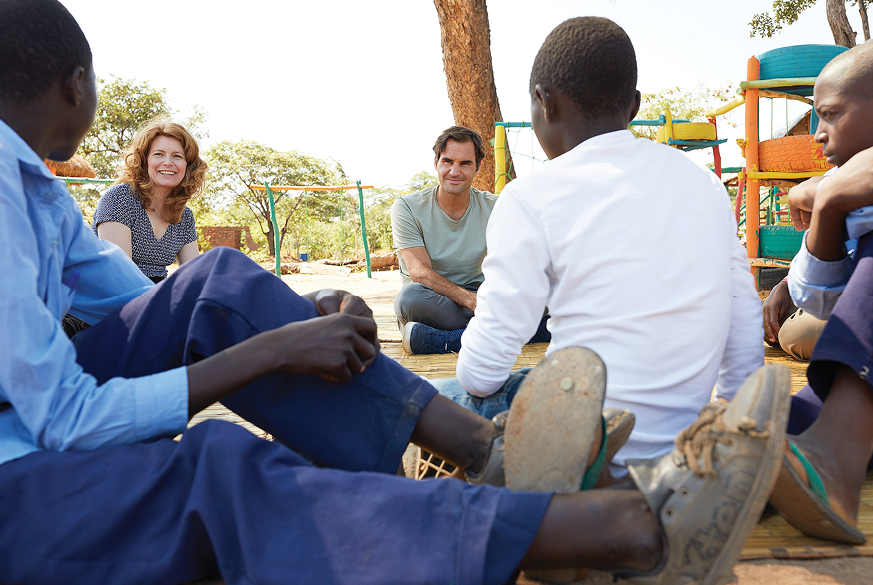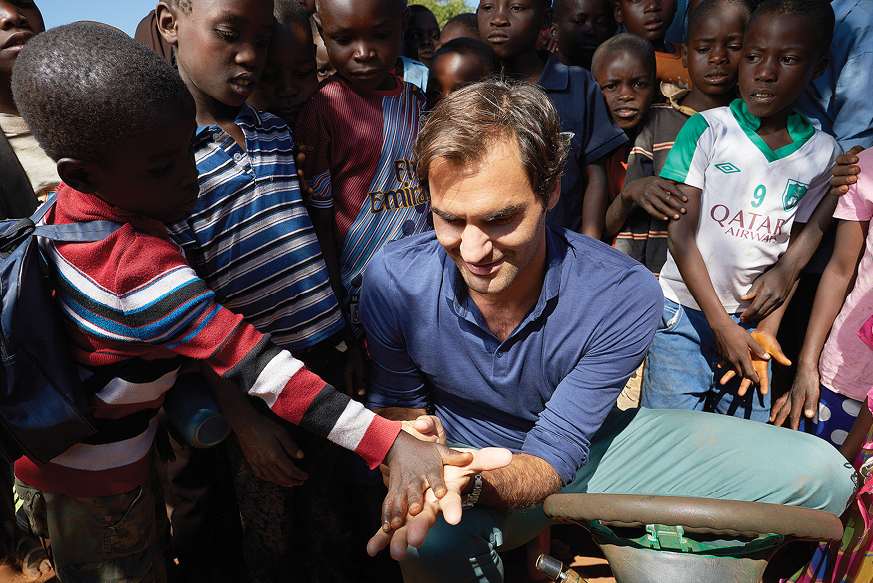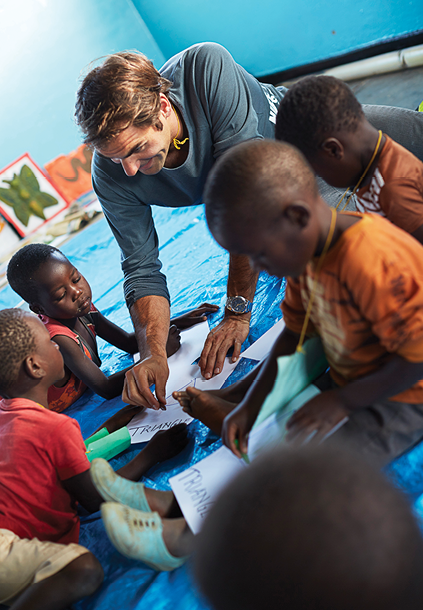- Home
- Media Kit
- MediaJet
- Current Issue
- Past Issues
- Ad Specs-Submission
- Ad Print Settings
- Reprints (PDF)
- Photo Specifications (PDF)
- Contact Us
![]()
ONLINE
![]()
ONLINE


Roger Federer Foundation CEO, Janine Händel,
together with Roger Federer in Zambia, listening to
representatives
of the Children Council
Enhancing Empowerment
Editors’ Note
Dr. Janine Händel joined the Roger Federer Foundation in 2010, seven years after its inception. She describes the Foundation as a learning organization, which is still only at the beginning of its journey. Through her leadership and professional approach, the Foundation has transformed itself from a straightforward donation charity to an ambitious impact-oriented and professional and systemic operation. Händel served for eight years as a Swiss diplomat with a focus on conflict transformation and human rights. Additionally, she was the head of philanthropy at the chairman’s office of a global company, and holds a doctor in law. She describes herself as a “naïve optimist,” believing that things can only change for the better and has devoted her professional life to humanitarian causes across the world. As a board member of and a philanthropy advisor to other foundations, she combines her experience in strategic grantmaking with her know-how in good governance and community development.
Organization Brief
The Roger Federer Foundation (rogerfedererfoundation.org) enhances a world where children living in poverty are able to take control of their future and actively shape it. There is sufficient evidence that proves that education is a prerequisite for reducing poverty, improving preventive healthcare and creating a committed civil society. In particular, access to quality early education is crucial as it is the foundation of all learning. In low-income countries, more than 80 percent of children do not have access to early education. The Foundation aims to give children the best start on their educational path through life by establishing and further develop existing early educational services in a sustainable way.

With Roger Federer, children immediately loose
their shyness – Eastern Province of Zambia, 2018
Will you highlight the history of the Roger Federer Foundation and how you define its mission?
Back in 2003, Roger won Wimbledon for the first time. It was a milestone in his young career, because he realized that he would be able to live his dream as a successful professional athlete. At the same time, he started reflecting on how he would like to develop further as a person. As a result, he set up his foundation to be able to empower children living in poverty. Roger was only 22 years of age at that time. Since then, it has been a learning journey and the Foundation has consistently become more professional, impactful, and ambitious behind its aim to achieve sustainable change.
Will you provide an overview of the work of the Foundation and its initiatives?
We are committed to strategic philanthropy and to our mission of empowering children living in poverty. The most effective and sustainable theory of change to achieve this goal is to provide a high-quality education system. Therefore, and in accordance with Sustainability Goal 4.2, we are fully focused not only on improving children’s readiness to go to school, but also on making schools ready for children. Together with our local partners, we have developed a regional comprehensive school readiness program which is implemented in six Southern African countries and Switzerland. By the end of 2026, we will have empowered approximately 12,000 preschools and 35,000 educators to give 1.5 million pre-primary aged children a good start into education.
“I believe in the strength and potential of the people. To achieve this fully, they sometimes require just a little support and empowerment. That is why, as a matter of principle, we enhance empowerment with
my foundation because we are convinced that, ultimately, only those affected can make lasting changes to their lives.”
Roger Federer
What are the keys to driving lasting, sustainable change in addressing the issue of early childhood education?
Quality early childhood care and education requires a comprehensive package of systemic intervention which makes it complex. It needs a range of stakeholders around the child to become involved as guarantors of quality education. Our approach is empowerment at all levels. In our programs, we sensitize, mobilize and capacitate not only educators, but also parents, school management committees, community leaders and government officials in order to achieve systemic and therefore sustainable change. We establish a process of joint responsibility to improve the learning environment with better classrooms, nutrition and playgrounds. We arrange learning groups and peer-to-peer mentoring among teachers and educators. Lastly, we prepare the ground for ongoing income generation for the learning institutions so that they can pay the educators and have funds to keep the high-level of quality.
How did the Foundation adapt the way it works to address the challenges caused by the global pandemic?
The pandemic represents in the countries of our engagement not only a health crisis, but foremost an education and social crisis. Schools have been closed for almost an academic year without any options for home-based learning. A whole generation of young learners have missed their full pre-primary education. This will have a long-term negative impact on their school performance. We arranged for rapid response to secure feeding during school closures and introduced a learning package for parents to stimulate at home. The Foundation, together with its partners, was able to implement programs despite many challenges. Nevertheless, many children will never reach their full potential because their education has been stopped for too long.

Roger Federer at a preschool in Malawi, 2015
How critical are metrics to measure the impact of the Foundation’s work?
It is our commitment to professionalism and our responsibility towards the beneficiaries that we are critically questioning our interventions on all levels. We need to understand and learn which measures are the most impactful ones and which activities don’t lead to the expected outcomes. Hence, our programs are implemented in line with a measurable and tangible indicator on an output, outcome and impact level. We are reviewing our planning on a biannual basis, revise certain approaches or add new components if the context has changed, or open up new opportunities to increase our leverage of impact. Impact measurement is very crucial, but it is also a major challenge to establish an efficient and accountable monitoring and evaluation system in the field. Lately, we have digitalized our data collection system together with our local implementing partners in a comprehensive manner so that a field officer is empowered not only to collect quality data, but also understands what the data is collected for.
Will you discuss Roger’s passion and commitment for the work of the Foundation and how deeply engaged he is in its efforts?
Roger is highly committed and ambitious when it comes to his philanthropic work. He lives the motto: Just doing good is not enough, we also have to do it well. This explains why he founded his own foundation instead of becoming an Ambassador to an existing organization. He wanted to take full responsibility for his charitable actions and aim for the highest standard in terms of governance and impact. There is no Foundation Board meeting without its President and all strategic decisions are taken by him. Although he has a very busy schedule, the work of the Foundation ranks high on his priority list. But what I most admire is his ability to learn and his openness to advice. This allows the Foundation to grow, both in size as well as in the quality of our work.
Did you always know you had a passion for this type of work and what makes the work so special for you?
I have been working in the humanitarian field for my whole life and was already active as a volunteer in my early teenage years. My job is definitely my passion and my calling. In all these years, I haven’t given up the belief that I can change the world – at least a bit. This is my daily experience in my work and it is my motivation every morning to aim for the highest level of impact with what we plan and do.
What are your priorities for the Roger Federer Foundation as you look to the future?
Our mission and ambition is to bring our ongoing School Readiness Strategy to create systemic change in the countries where we operate. By 2026, we hope that our approach and tools will not only be recognized by the education ministries, but will find further dissemination without our external support as part of the education system. In some countries there are already first developments in this direction, but there is still a long way to go – and a little bit of luck certainly couldn’t hurt us either.![]()